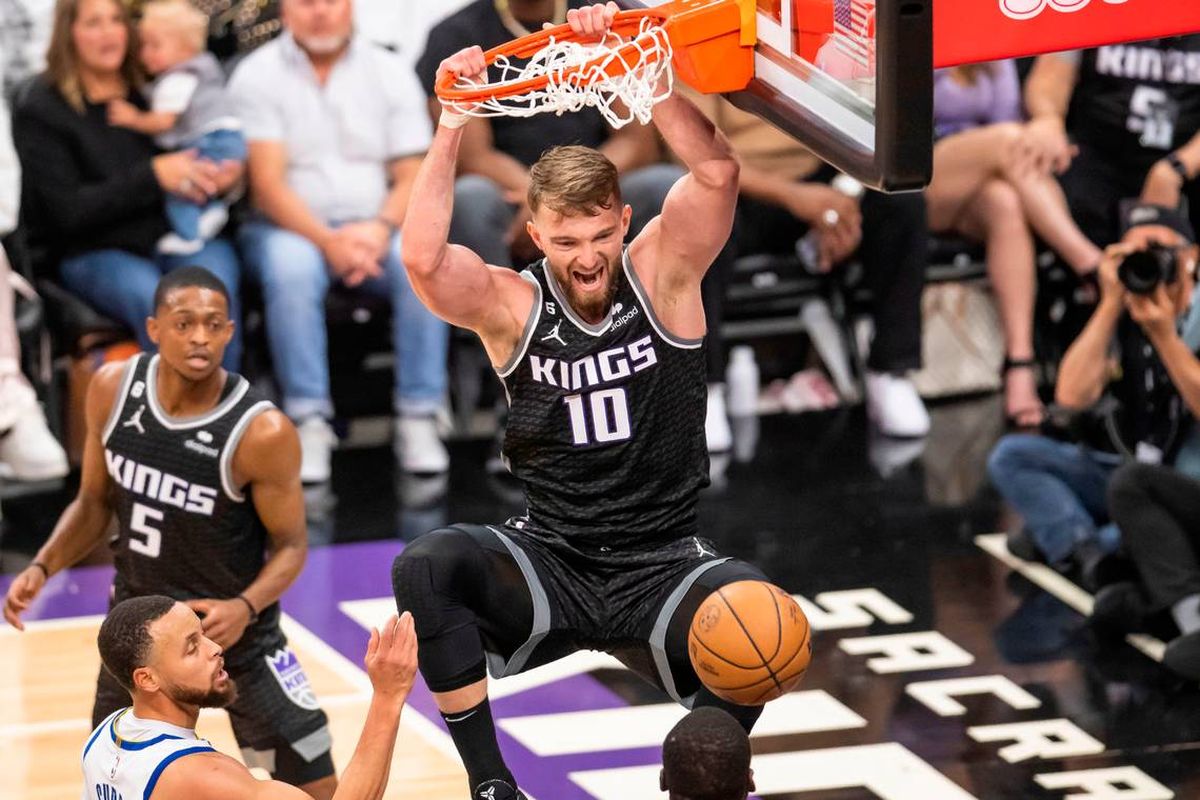Former Gonzaga big man Domantas Sabonis helped transform the Sacramento Kings. Now he’s undergoing a spiritual transformation

With bulging muscles, gleaming eyes and unbridled enthusiasm, three-time All-Star Domantas Sabonis has at times seemed like a superhero this season. The versatile big man often brings up the ball and initiates the offense like an orchestra leader.
Still, his vulnerability makes him seem like a real-life version of Tony Stark’s Ironman.
Already playing with a thumb in need of surgical repair, the Sacramento Kings and former Gonzaga star emerges from hard drives to the basket and rebound scrums – all with seeming disregard for his health – clutching his jaw, checking his eyes or his nose or some other body part, making sure they are still intact. And Kings fans hold their collective breath.
That was never more true than Monday in Game 2 of the Interstate 80 series between the Kings and the defending NBA champions Golden State Warriors. Sabonis was stomped on the chest by the Warriors’ Draymond Green.
In one of the most dramatic moments in Kings history, Sabonis writhed in pain for several minutes before helping lead the team to a win.
Among the fans witnessing that drama at Golden 1 Center on Monday was Rob Archie, a Sacramento restaurateur, Kings season ticket holder and former pro basketball player in Italy.
“The guy leads by example. He clearly believes in something.” Archie said. “De’Aaron (Fox) was carrying too much on his shoulders, and Domas’ leadership has allowed De’Aaron to just ball this season. It’s the perfect combination.”
A religious conversion
Being a crucial leader of the resurrected Kings franchise is not the only conversion that Sabonis has been passionate about. The Lithuanian American center, 26, is married to a Jewish woman, Shashana Sabonis. Quietly over the past two years, Sabonis has been studying to convert to Judaism, mostly over Zoom sessions with Rabbi Erez Sherman of Sinai Temple in Los Angeles.
Sabonis extends the same dedication to his religious studies as he does to honing his skills on the court. Sherman told the Times of Israel that after Sabonis had a triple-double against the Houston Rockets and “I get a text, like, ‘Hey can we find time to learn?’ I’m like, ‘You’re for real.’ ” But they also veer off to the spiritual and discussions about social issues.
Sherman is not your typical rabbi. He hosts a sports podcast, “Rabbi on the Sidelines,” that explores the intersection of sports, religion and society.
In a discussion with Charles Barkley and Ernie Johnson on TNT after All-Star guard Kyrie Irving posted a link to an antisemitic documentary, it was Sherman who helped turn the controversy into a teachable moment.
“Tweets and words can lead to dangerous actions and consequences,” Sherman wrote. “Yet, the solution does not always have to be to put down. Rather, it must also include how to lift up. Sports provide an untapped opportunity to do just that.”
When news of Sabonis’ conversion trickled out just before the beginning of the playoffs, Jewish basketball fans were smitten.
“Light the Bema” (a reference to the raised platform where religious services are led) Michael Silverstein joked on Twitter. Though Silverstein is a Celtics fan, he said, “that much like most of NBA fandom, I’ve been caught up in the Kings season, and am pulling for them for sure to come out of the West (and lose to the Celtics in the Finals).”
Pride of a mayor
Sacramento Mayor Darrell Steinberg said the story of Sabonis’ conversion has inspired him.
“Conversion: That is an individual choice and the Jewish people are very clear and insistent that we don’t preach conversion,” Steinberg said. “It’s not what we do. But when somebody chooses to become Jewish, to be part of our faith, great traditions, our history, and the pain, that means a lot.”
Steinberg, who is Jewish, said after the playoffs he would invite “a Jewish NBA champion” to his office, possibly for bagels and lox to celebrate.
Mona Alfi, rabbi of Congregation B’nai Israel in Sacramento, also finds Sabonis’ conversion a cause to celebrate.
“I was absolutely delighted,” Alfi told her congregation on the eve of the first playoff game with Golden State about Sabonis’ conversion. “He seems like a very thoughtful person who is taking this very seriously, who is looking at his spiritual life and his intellectual life.
“That’s part of the reason I love Kareem Abdul-Jabbar, not Jewish, but I love that his spiritual life motivates the work that he does off the court as well.”
Sabonis’ conversion to Judaism could vault him to among the greatest Jewish basketball players of all time.
The best Jewish player?
Douglas Stark, a historian and author of “When Basketball was Jewish,” said that is no small feat.
Stark explained that, in basketball’s early days, Jews became associated with the sport “because it was played in these inner cities, these tenement houses and these immigrants saw the sport as a way to assimilate.”
Stark said from watching Sabonis, he shared some qualities with legends such as Hall of Famer Dolph Schayes, who played 15 seasons, almost entirely for the Syracuse Nationals, beginning in 1949.
“I know that he wasn’t born Jewish and is in the process of converting,” Stark said, “but there is something Jewish about his game.
“If you look back 75-plus years ago, Jewish players in these tenements had to play in confined spaces. They had to learn to pass the ball more, to cut more, to set screens more, and I think it became more of a sort of intellectual game.
“I see those qualities in Damontas, but there is of course something decidedly modern there.”